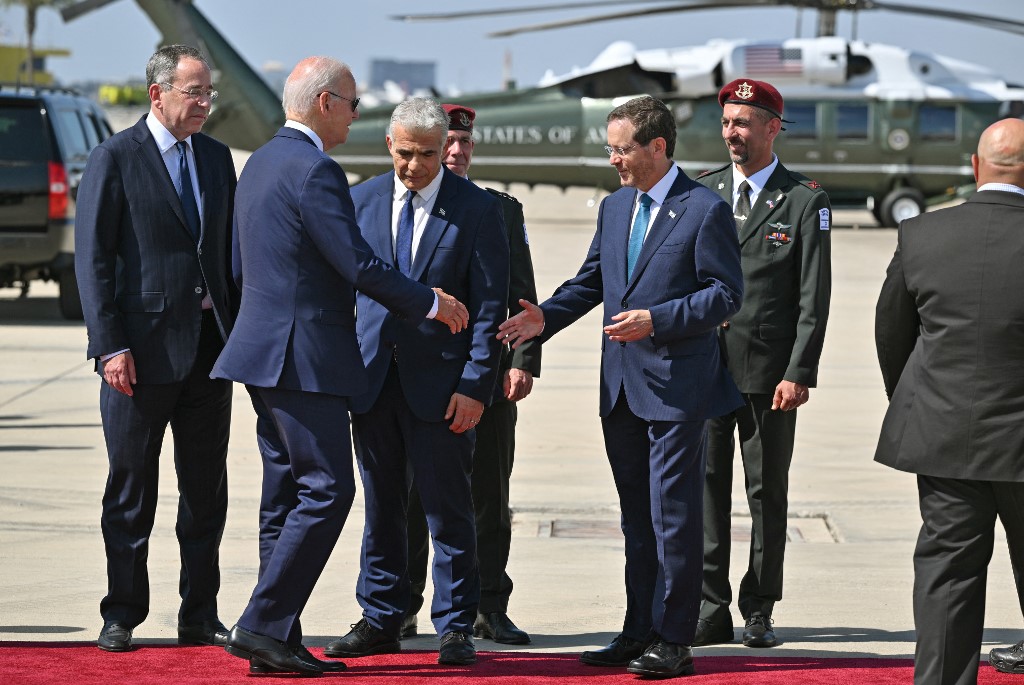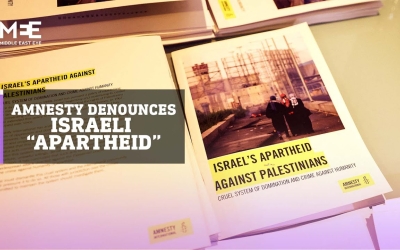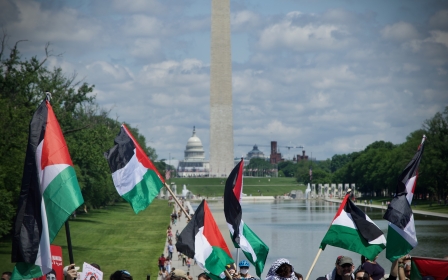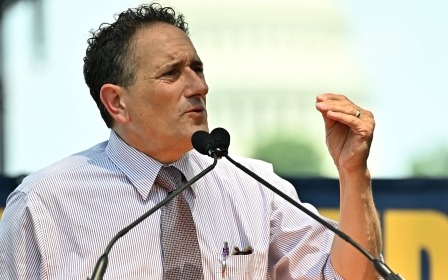Biden says he's committed to a two-state solution, so why isn't he working towards it?

The two-state solution where Israel and Palestine exist as two independent states has long been the stated position of the United States.
While the prospect seems impossible due to the reality on the ground, US President Joe Biden has continued to reiterate it as a solution since taking office.
"Israel must remain an independent, democratic Jewish state," Biden said during his recent trip to Israel and the Middle East. "The best way to achieve that remains a two-state solution, for two people, both of whom have deep and ancient roots in this land, living side by side in peace and security."
Like his predecessors, Biden offered no details on how such an outcome could come to fruition. If the administration knows the solution is seemingly dead, and if much of Israeli politics is opposed to it in practice, then why does it keep pushing for it?
'The two-state solution is dead because Israel killed it, slowly and deliberately over decades'
- Omar Baddar, former deputy director at the Arab American Institute
Addressing the right-wing Tzomet Party on 15 November 1998, Ariel Sharon - who was then Israeli foreign minister - said: "Everybody has to move, run and grab as many [Palestinian] hilltops as they can to enlarge the [Jewish] settlements because everything we take now will stay ours, and everything we don't grab will go to them."
New MEE newsletter: Jerusalem Dispatch
Sign up to get the latest insights and analysis on Israel-Palestine, alongside Turkey Unpacked and other MEE newsletters
On the surface, a two-state solution would establish an independent Palestinian state alongside Israel. But simply drawing a line between the two will not work. There is the question of borders, the right of return for refugees, security, and the holy land of Jerusalem.
In 1993, Israeli and Palestinian leaders signed the Oslo Peace Accords at the White House, an agreement that was overseen by President Bill Clinton. Though the world hoped the agreement would bring a peaceful resolution and greater self-determination for Palestinians, according to many analysts, it worsened life for Palestinians and has ultimately failed.
In 1998, the Clinton administration sponsored negotiations between Israel and the Palestine Liberation Organisation (PLO), in what was called the Clinton Parameters.
In 2002, George W Bush drew out his own "roadmap" for the two-state solution, which he referred to as the Plan for Peace. Later, the Trump administration would lay out its Peace to Prosperity - dubbed "the deal of the century" by its proponents - which strongly favoured Israel.
Despite all of these plans for a two-state solution, the US continues to be vague, Hussein Ibish, a senior resident scholar at the Arab Gulf States Insititute in Washington, told Middle East Eye.
"I think the US is vague. And I think that's part of the problem. I think it's important for everybody to press people when they say 'I'm in favour of a two-state solution' or 'I'm in favour of a one-state solution.' What do you mean by that? Is it something that's meaningful or is it just gibberish? How are you going to get these guys to agree to it? What about settlers? What about the refugees?"
Ibish explained that in the short term, there is no path to peace because peace is the absence of conflict - and conflict will remain when one side practises apartheid against the indigenous population.
"We don't really have the building blocks to resolve the conflict. It means rebuilding [Palestine's] infrastructure, rebuilding their institutions, and rebuilding their civil society. Right now, it's moribund in the West Bank," he said.
Outdated assumptions
To date, the US has provided $150bn in bilateral assistance and missile defence funding to Israel. In 2021, the US House of Representatives overwhelmingly approved $1bn in new funding for Israel’s Iron Dome missile defence system.
The US continues to fund the missile defence system for a state that rights organisations like Amnesty International have labelled as committing apartheid.
In March, the United Nations special rapporteur on human rights in the occupied Palestinian territories submitted a report to the UN Human Rights Council, concluding that "Israel has imposed upon Palestine an apartheid reality in a post-apartheid world".
Despite its posturing on finding a two-state solution, the US has continued to unconditionally provide aid to Israel.
"It's stuck on its policies. If you look at US military aid to Israel and other countries in the region, with the US providing them with weapons, it is all based on outdated assumptions," Raed Jarrar, the director of advocacy at Democracy for the Arab World Now (Dawn) told MEE.
"It's outdated. It's on autopilot. And it's just another example of the status quo in Washington DC where we just do things because we have been doing them.”
He explained that a one-state solution already exists - the Israeli Zionists' one-state solution, he called it.
"It's an apartheid state that treats Palestinians as second-class humans. The US is the signatory of many international treaties. Unfortunately, the US is also the main partner of Israel - and US political and financial support maintains Israel's apartheid," he said.
'US lacks political will'
Jarrar said that by sitting back and pushing for a solution that is dead, the US is not only tolerating apartheid, but it's also contributing to it.
"When it comes to Israeli violations, we give this $3.8bn a year of military aid. That is literally a blank cheque with no monitoring or tracking. The US government has refused to hold Israel accountable for many serious violations, whether it’s the killing of Shireen Abu Akleh, or many citizens, or the daily violations of human rights."
Omar Baddar, the former deputy director at the Arab American Institute, believes a true solution will only come once the US acknowledges its role in contributing to apartheid.
"The two-state solution is dead because Israel killed it, slowly and deliberately over decades," he told MEE. "The US lacked the political will to push Israel into ending its illegal occupation of the Palestinian territories, so Israel's expansionist attitude reached a point where reversing course looks nearly impossible."
He explained how US political leaders are afraid to acknowledge the reality that Israel has permanently become an apartheid state because it is more politically convenient in the US to "keep pretending" there is still a path forward towards a two-state solution.
"In other words, continued US rhetoric about a two-state solution is domestic-looking political cowardice at the expense of Palestinian freedom and basic human rights first and foremost, but also at the expense of regional peace and stability in the Middle East."
Middle East Eye delivers independent and unrivalled coverage and analysis of the Middle East, North Africa and beyond. To learn more about republishing this content and the associated fees, please fill out this form. More about MEE can be found here.






